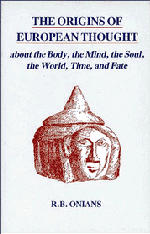Book contents
- Frontmatter
- Contents
- Preface to the first edition
- Preface to the second edition
- Introduction: The Earliest Greeks
- PART I THE MIND AND THE BODY
- Chapter I Some Processes of Consciousness
- Chapter II The Organs of Consciousness
- Chapter III The Stuff of Consciousness
- Chapter IV Cognition—The Five Senses
- Chapter V The Liver and the Belly
- PART II THE IMMORTAL SOUL AND THE BODY
- PART III FATE AND TIME
- ADDENDA
- Indexes
Chapter V - The Liver and the Belly
Published online by Cambridge University Press: 06 August 2010
- Frontmatter
- Contents
- Preface to the first edition
- Preface to the second edition
- Introduction: The Earliest Greeks
- PART I THE MIND AND THE BODY
- Chapter I Some Processes of Consciousness
- Chapter II The Organs of Consciousness
- Chapter III The Stuff of Consciousness
- Chapter IV Cognition—The Five Senses
- Chapter V The Liver and the Belly
- PART II THE IMMORTAL SOUL AND THE BODY
- PART III FATE AND TIME
- ADDENDA
- Indexes
Summary
χόλος, usually translated ‘wrath’, appears to be another form of the un-Homeric χολή, ‘bile’. With angry emotion there is often obvious biliary disturbance, and Homer's ‘On χόλος your mother reared you, pitiless one!’ shows that χόλος was conceived as substantial. For Homer the heart and lungs (ϕρένες) were the emotional centre of the body and so χόλος was believed to enter those organs. It is spoken of as in the θυμός, in the heart, in the ϕρένες or in the chest. Bile was indeed believed to enter the organs above the diaphragm as liquid. Thus it is that in the Agamemnon Aeschylus has ἐπὶ δὲ καρδίαν ἔδραμε κροκοβαϕὴς σταγών, ‘to my heart has run a saffron-dyed drop’, and in the Choephori explicitly κἀμοὶ προσέστη καρδίας (καρδίᾳ Scal.) κλυδώνιον/χολῆς, ἐπαίσθην δʾ ὡς διανταίῳ βέλει. Anaxagoras taught that χολή ‘was the cause of acute disorders (νοσημάτων), because overflowing it spurted to the lung and the veins and the ribs’. With this also should be related the belief manifest in Aeschylus and the other tragedians that painful emotion strikes the liver. Thus in the Agamemnon πολλὰ γοῦν θιγγάνει πρὸς ἦπαρ, δῆγμα δὲ λύπης οủδὲν ἐϕʾ ἦπαρ προσικνεῖται, and in the Eumenides—the task of the Furies—ἄλγησον ἦπαρ ἐνδίκοις ὀνείδεσιν. The κροκοβαϕὴς σταγών is caused by an awful feeling, stirred by the words of Kassandra, that tragedy is on its way, and the κλυδώνιον χολῆς was raised in Elektra by the emotional shock of seeing a lock of hair of the long-missing Orestes.
- Type
- Chapter
- Information
- The Origins of European ThoughtAbout the Body, the Mind, the Soul, the World, Time and Fate, pp. 84 - 90Publisher: Cambridge University PressPrint publication year: 1988



